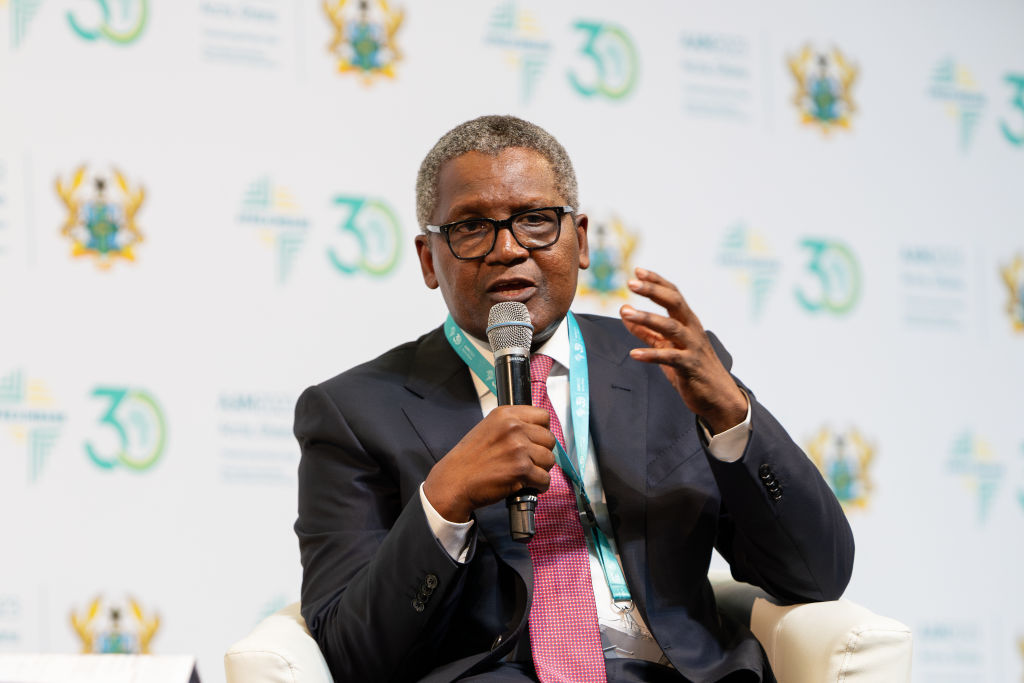Meet The Richest Black Man In The World
Source: Ernest Ankomah / Getty
Aliko Dangote, hailing from Nigeria, is frequently recognized as the wealthiest Black individual globally. His wealth primarily stems from his conglomerate, the Dangote Group, which has been instrumental in the distribution of key commodities such as cement, sugar, salt, and flour. As of April 2024, the Nigerian businessman’s net worth stands at a staggering $15.8 billion, according to Forbes.
Dangote, born in 1957, grew up in a wealthy family in Kano State, Nigeria. From an early age, he displayed an entrepreneurial spirit, selling sweets to his classmates in primary school and later venturing into small trading businesses, Forbes noted. His innate knack for business was evident and inherited from members of his family who were also heavily invested in business throughout Kano.
At one time, Dangote’s grandfather, Sanusi Dantata, held the distinction of being among the wealthiest residents of Kano, Forbes noted. His wealth was amassed through the trade of commodities such as oats and rice. Following the passing of Dangote’s father in I965, Dantata assumed the role of Dangote’s guardian.
After graduating from Egypt’s Al-Azhar University in 1977, Dangote borrowed a $3,000 loan from his uncle to start his own business, according to Investopedia. Armed with funding, the business guru ventured into the importation of soft commodities, procuring rice from Thailand and sugar from Brazil at wholesale prices. Dangote astutely capitalized on this opportunity by retailing these goods in his village, achieving significant profits through strategic pricing strategies.
The business swiftly flourished into a lucrative enterprise, becoming a primary source of income. During the peak of the business’s success, Dangote earned a remarkable daily net profit of $10,000. Such profitability enabled him to settle his debt with his uncle within a mere three months.
Dangote founded the Dangote Group in 1978. Initially a small trading firm dealing in commodities like cement, sugar, and rice, the company rapidly expanded its reach and diversified its interests. In 1997, the entrepreneur recognized the exorbitant costs associated with acting as a middleman. Consequently, he took decisive action by establishing a plant for the production of commodities he had previously imported and sold for over two decades: pasta, sugar, salt, and flour.
Simultaneously, Dangote acquired a state-owned cement company around the same period, which would become Dangote Cement. By 2005, he undertook a significant expansion of the company’s operations, investing in the construction of a multimillion-dollar manufacturing plant. Financing for the project included $319 million of Dangote’s funds and a $479 million loan from the International Finance Corporation, an affiliate of the World Bank.
Dangote Cement makes up the majority of the Nigerian entrepreneur’s business portfolio at 85%. The business produces 48.6 million metric tons of cement every year and operates in 10 African countries. Each manufacturing division under his leadership has subsequently undergone separation, now operating as publicly traded entities: Dangote Sugar Refinery PLC, National Salt Company of Nigeria PLC, and Dangote Cement PLC (Dangote, “Investor Relations”).
Giving Back.
Over the years, Dangote has used his wealth to create change across Sub-Saharan Africa. Established in 1994, the Dangote Foundation is a charitable organization dedicated to enhancing the well-being of people across Africa, according to the foundation’s website. Driving impactful initiatives in healthcare, education, empowerment, and poverty alleviation, Dangote donated $1.25 billion to the Dangote Foundation in March 2014 to jumpstart the foundation.
Among its most notable partnerships, the Aliko Dangote Foundation embarked on a monumental collaboration with the Bill and Melinda Gates Foundation and key governmental bodies in northern Nigerian states, commencing in 2013. Together, they endeavored to eradicate polio and fortify routine immunization efforts in Nigeria, marking a significant milestone in their shared commitment to public health.
SEE ALSO:
Black People Made Up 61% Of Exonerees In 2023, New Report Finds
Breaking Down The Stereotype: Are Black People More Athletic?
The post Meet The Richest Black Man In The World appeared first on NewsOne.

